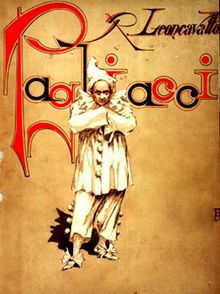I Pagliacci

by Ruggero Leoncavallo
“You must prepare yourselves to witness the passions of real men and women!”
Tonio’s Prologue could be the manifesto of the verismo movement. The quintessential opera of that genre, Pagliacci is all the more shocking and poignant in this electrifying English performing translation.
Excerpt:
Act I, Canio: “Recitar…Vesti la giubba“
"Play your part, while you're writhing in torment! You won't know what you're doing, or what you're saying. It must be done! Force yourself! Are you not a man? No, just a clown! Put on your costume and whiten your face. The people pay you and must be entertained. And when Arlecchino steals your Colombina, smile and play the fool, and they will all applaud. Just make a joke of your tears and anguish. Conceal your grief and your sobs with a grin. For you are Pagliaccio. Though your life has been shattered, laugh through the pain that is stabbing your heart!"
Copyright Kenneth Jakobs 2003, 2010
All rights reserved
Notes
Of the half-dozen or so verismo (meaning “realism”) operas that are still in the standard repertoire, Pagliacci (“Clowns”) stands out as the most expressive, violent and touching. Its characters are common people, struggling to make a living in a cruel world where life is cheap and hunger a constant threat. As Tonio says in the Prologue, “We’re flesh and bone, no different than you, stumbling blindly all of our lives through this god-forsaken world—poor players on a stage”.
And while we may not condone their behavior, it is impossible not to sympathize with them, motivated as they all are, by the basic need for a little human warmth and affection in their bleak lives. These are not evil people but the victims of the tragedy of poverty.
True, Nedda is betraying her husband by making love to Silvio (and, we imagine, others). But what joy has she gotten from marriage to an extremely jealous, tyrannical older man who found her as a child and coerced her to marry? She does treat Tonio cruelly and mocks his affliction, but we can imagine that this is not the first time he has stalked and sexually harassed her. Tonio in turn, was born deformed and has been scorned and denied the affections of women. Of course he loves Nedda, and when rebuffed, seeks solace in revenge. Canio knows that Nedda doesn’t love him, but is he wrong to expect her to at least be grateful for the life he has given her? He murders the lovers without justification from our modern, “civilized” perspective, though shedding the blood of an unfaithful wife and her lover is regarded as honorable in some cultures, and this is southern Italy in the 1870’s. As Canio tells Nedda just before he stabs her, “A man has little but his honor. And when it’s taken from him, only blood can restore it!”
The magnificent score makes the pain of every one of these characters palpable and searing, and I have tried to imbue my translation with it as well. In the end, there is nothing but shock and sadness. When “the comedy is over”, all are punished, even the conniving Tonio whose vengeance has cost him his livelihood.
